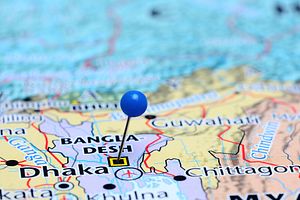The horrific and dastardly attack on innocent civilians in an upscale bakery in a posh section of Dhaka, which took the lives of 22 persons, mainly foreigners, is yet another instance of the rise in terrorism in the country. However, those who have been closely following Bangladesh politics might have seen this coming.
Over the past last three years, over 30 people belonging to minority communities, mainly Hindus, have been brutally murdered by machete wielding radicals. They had also not spared Muslim secular writers, publishers, and bloggers for raising their voices against extremist ideology. The recent attack, unlike the earlier lone wolf attacks, is certainly not the handiwork of these local elements. The way the attack was planned and executed points a finger either at Islamic State (ISIS) or al-Qaeda, though the government has been quick to blame local groups for carrying out the attack. So far, Bangladesh’s government has refused to accept the involvement of either ISIS or al-Qaeda for the attack.
In the earlier isolated attacks, the Bangladeshi government blamed the main opposition for its complicity, and also failed to follow the trail of radical elements affiliated to Jamaat-ul-Mujahideen Bangladesh (JMB). It had also criticized the secular writers for misinterpreting Islam, and thereby provoking the radical elements. Unfortunately, the government’s approach only emboldened the fringe groups carrying out attacks on people belonging to religious minority groups as well as expatriates. By not going after the extremist groups, the government is solely responsible for the rise of religious extremism in Bangladesh.
On a careful analysis, there are three factors fueling for the sudden spurt in violence in Bangladesh. Two are local; one is global.
The first local factor is the hanging of both Salahuddin Quader Chowdhury, a senior opposition leader and former minister in Khaleda Zia’s government, and Ali Ahsan Mohammad Mujahid of the Jamaat-i-Islami party, who were involved in war crimes, especially the killing of Hindus, during the 1971 war of liberation. Those executions, combined with the recent arrests of over 10,000 persons belonging to different religious organizations, could have provoked an extremist backlash. The government has been accused of carrying out arbitrary arrests mainly to silence its political opponents.
Second, the Sheikh Hasina government has been accused of being authoritarian, and has also been accused of muzzling the press and arresting intellectuals who have been critical of the government’s repressive policies. One example is the arbitrary arrest of the editor of the popular online newspaper the Daily Star, who has been accused of collaborating with the military-led coup in 2007 and running false stories against Sheikh Hasina. That repression also contributes to the violent response.
The main global factor, meanwhile, is the growth of madrasas (religious schools) mainly funded by Saudis. These schools have been responsible for indoctrinating young, impressionable minds with an extremist ideology that is at variance with the teachings of Islam. Muslims belonging to other sects (like Shias), Christians, and Hindus have all been targeted by the Islamists. What is unforgivable is that the West was complicit by looking the other way when Saudis were pouring in money to set up religious schools designed to propagate an extremist ideology. We are now paying a heavy price for their inaction. The government should closely monitor those schools that are imparting religious ideology that does not respect other religions and should come down heavily on such institutions. There is no gainsaying that the ultimate battle against the radical brand of Islam will be won in schools and colleges.
One alarming difference in the recent attack is that, unlike the earlier attacks, which were carried out by people from poor backgrounds, this time the violence was executed by those who had studied in elite schools and colleges, and who came from affluent families. The Dhaka attack has shown that even people who are highly educated are now being drawn to this particular Wahhabi ideology.
There are indications that ISIS, which has been facing reverses in Syria and Iraq, may spread its tentacles in South Asia and may target Pakistan, India, and Bangladesh. The Bangladeshi government refuses to accept that ISIS has infiltrated the country, instead blaming local groups for the recent attack. According to knowledgeable sources, however, ISIS has indeed taken root in Bangladesh, as the scale of Gulshan bakery attack went beyond the capability of local groups.
The only way forward is a concerted action against all those responsible for spreading hatred in society and all those who are committing crimes against humanity. The need of the hour is for the intelligence agencies in Pakistan, Bangladesh, and India to work closely to monitor the activities of terror groups, especially the ones operating from Pakistan, and develop a security architecture to prevent such attacks. In India, information based on intelligence inputs helped the police to bust an important terror cell, which was planning an attack on the VIPs.
The countries in South Asia have realized that, even after enforcing counterterrorism strategies, there is no guarantee that Dhaka-type attacks can be stopped. Although there is no foolproof system to preempt all attacks, an exchange of intelligence will definitely help these countries to minimize such attacks. Pakistan also needs to act on terrorists operating from its soil, for these very groups may come to haunt them in future. A hard task, but it is the only way to effectively combat terrorism.
K.S.Venkatachalam is an independent columnist and political commentator. He writes a regular column for the Huffnigton Post and Express Tribune. His articles have also been featured in The Hindu, South China Morning Post, the Friday Times, The Diplomat and the Global Times.

































